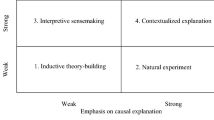Abstract
It is argued that case studies can be classified as either describing or explaining a particular research phenomenon and as such researchers first need to finalize which approach they are going to adopt. The concept of explanation suggests a realist approach and description suggests an interpretive approach. If explanation is the target, the selection of a theoretical approach for a longitudinal study is made more difficult as organizational contexts can alter radically from that in place at the initiation of a study—totally different approaches may be necessary to best explain the underlying "reality" of the situation. This article suggests that Bhaskar's (1979, 1986) philosophy of critical realism can provide some guidance as to the theoretical approach to adopt. A framework is developed based on a critical realist argument for the consideration of both structure and agency in research, the suggestion being that different organizational situations require differing emphasis on structure or agency.
Similar content being viewed by others
REFERENCES
Alvesson, M. (1996). Communications, Power and Organisation, de Gruyter, Berlin.
Archer, M. (1995). Realist Social Theory: The Morphogenetic Approach, Cambridge University Press, Cambridge.
Berle, A. A. (1969). Power, Harcourt, Brace, World, New York.
Bhaskar, R. (1978). A Realist Theory of Science, Harvester Press, Sussex, UK.
Bhaskar, R. (1979). The Possibility of Naturalism, Harvester Wheatsheaf, Hemel Hempstead, UK.
Bhaskar, R. (1986). Scientific Realism and Human Emancipation, Verso, London.
Bhaskar, R. (1991). Philosophy and the Idea of Freedom, Blackwell, Oxford.
Bunge, M. (1993). Realism and antirealism in social science. Theory and Decision, 35, 207-235.
Cavaye, A. (1996). Case study research: A multi-faceted research approach for IS, Information Syst. J. 6, 227-242.
Chia, R. (1996). The problem of reflexivity in organisational research: Towards a postmodern science of organisation, Organisation 3, 31-60.
Collier, A. (1994). Critical Realism: An Introduction to the Philosophy of Roy Bhaskar, Verso, London.
Craib, I. (1992). Modern Social Theory: From Parsons to Habermas, Harvester Wheatsheaf, Hertfordshire, UK.
Darke, P., Shanks, G., and Broadbent, M. (1998). Successfully completing case study research: Combining rigour, relevance and pragmatism, Information Syst. J. 8(4), 273-290.
Glaser, B., and Strauss, A. (1967). The Discovery of Grounded Theory: Strategies for Qualitative Research, Aldine, Chicago.
Golomb, J. (1995). In Search of Authenticity, Routledge, London.
Kilduff, M., and Mehra, A. (1997). Postmodernism and organisational research. Acad. Manage. Rev. 22(2), 453-481.
Layder, D. (1993). New Strategies in Social Research: An Introduction and Guide, Polity Press, Cambridge.
Miles, M., and Huberman, M. (1994). Qualitative Data Analysis, Sage, Thousand Oaks, CA.
Mingers, J. (1984). Subjectivism and soft systems methodology—A critique. J. Appl. Syst. Anal. 11, 85-103.
Mingers, J. (1995). Self-Producing Systems: Implications and Applications of Autopoiesis, Plenum Press, New York.
Probert, S. (1997). The actuality of information systems. In Mingers, J., and Stowell, F. (eds.), Information Systems: An Emerging Discipline, McGraw-Hill.
Reed, M. I. (1997). In praise of duality and dualism: Rethinking agency and structure in organisational analysis. Organisation Studies 18(1), 21-42.
Roman, L. (1992). The political significance of other ways of narrating ethnography: A feminist materialist approach. In LeCompte, M., Millroy, W., and Preissle, J. (eds.), The Handbook of Qualitative Research, Sage, Thousand Oaks, CA.
Rosenau, P. (1992). Postmodernism and the Social Sciences, Princeton University Press, Princeton, NJ.
Schaller, P., and Tobin, K. (in press). Quality control and the genres of qualitative research. In Taylor, P. C., Tobin, K., and Gilmer, P. (eds.), Sunflowers: The Blooming of College and University Education. Hillsdale, NJ: Erlbaum.
Stake, R. E. (1994). Case studies. In Denzin, N. K., and Lincoln, Y. S. (eds.), Handbook of Qualitative Research, Sage, Thousand Oaks, CA.
Walsham, G. (1993). Interpreting Information Systems in Organisations, Wiley, Chichester, UK.
Walsham, G. (1995). Interpretive case studies in IS research: Nature and method. Eur. J. Information Syst. 4, 74-81.
Weber, R. (1997). Ontological Foundations of Information Systems, Coopers & Lybrand, Melbourne.
Yin, R. K. (1994). Case Study Research: Design and Methods, 2nd ed., Sage, Thousand Oaks, CA.
Author information
Authors and Affiliations
Rights and permissions
About this article
Cite this article
Dobson, P.J. Longitudinal Case Research: A Critical Realist Perspective. Systemic Practice and Action Research 14, 283–296 (2001). https://doi.org/10.1023/A:1011307331290
Issue Date:
DOI: https://doi.org/10.1023/A:1011307331290




